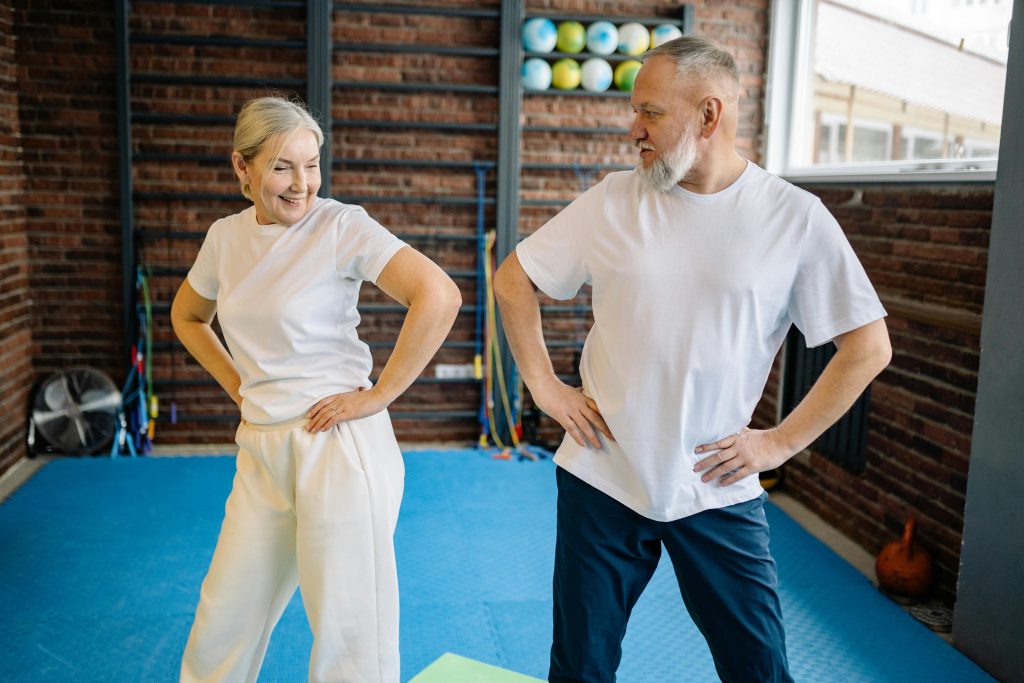The world of health advice can feel like a maze these days. When it comes to choosing between a nutrition coach and a dietitian, how do you decide?
Imagine two friends: one provides motivating support and practical guidance, while the other offers scientifically backed, professional advice. Nutrition coaches focus on motivation and personalized lifestyle adjustments, while dietitians dive deep into your health with clinical expertise and credentials.
Both aim to help but from different angles. If you prefer personalized encouragement, a coach might be the right fit. For medically informed strategies, a dietitian brings specialized knowledge.
Whether you’re aiming for weight loss or managing a health condition, understanding these roles can help you make an informed choice. Let’s break it down together and figure out what aligns best with your health goals.

What Are Nutrition Coaches?
A. Roles And Responsibilities
Nutrition coaches are your cheerleaders, showing you the way to healthier lifestyle choices.
They look at more than just what you eat. They also consider exercise, sleep, and stress to create an overview.
They tailor everything to your goals too by creating personalized nutrition plans.
Imagine that someone came up with a food plan just for you. It seamlessly fits into your busy schedule and teaches you stress-coping strategies through mindful eating practices.
They use advanced behavior-change techniques. These strategies allow you to break past barriers that may have stopped you from achieving your health goals.
If late-night snacking is your nemesis, a nutrition coach can help you tackle the habit, perhaps suggesting a calming herbal tea as a healthier alternative. What’s great about nutrition coaches is their versatility—they work in a variety of settings. You’ll find them in corporate wellness programs, helping employees improve their eating habits to boost productivity.
In fitness centers, they guide gym-goers on fueling their workouts effectively. Some even run private practices, offering personalized one-on-one sessions for a tailored approach.
B. Qualifications And Training
You don’t have to go to medical school to become a nutrition coach. You do need some solid credentials.
Several leading certifying agencies — such as ISSA, ACE, and NASM — have programs that are recognized around the world. Interestingly, ACE is the most popular, due to its hands-on approach and detailed curriculum.
Earn a bachelor’s degree in nutrition or a related field. Then, seek out certification from a professional organization to bolster your credentials.
As trends in nutrition change, so do the coaches. They’re constantly learning, and keeping up with the latest in nutrition science and coaching techniques.
That means they have practical experience, so you get the most current advice and assistance.
C. Common Career Paths
Nutrition coaching offers a wide range of career paths, reflecting the diversity of the people they help. Coaches can transition into wellness coaching, focusing on overall health, or work in corporate environments to design programs that keep employees healthy. Many also operate in private practice, offering personalized one-on-one coaching sessions. In gyms, nutrition coaches educate clients on the relationship between food and exercise.
There’s plenty of room for specialization too. Some coaches focus on sports nutrition, helping athletes optimize their performance through diet, while others specialize in weight loss, using evidence-based methods for healthy weight management. These roles thrive in non-clinical settings, where the emphasis is on wellness rather than medical practice.
For those considering a career change, becoming a nutrition coach can be a quick switch. With prior experience, like being a certified personal trainer, you could train in just 3 to 6 months, leveraging your existing background to accelerate the process.
What Are Dietitians?
A. Roles And Responsibilities
Dietitians are the detectives of the food world. They dig into your eating habits and health goals in detail.
They do extensive nutritional assessments to determine what your body needs. They take that information and use it to recommend personalized meal plans that fit you like a glove.
Dietitians are exceptional when it comes to medical nutrition therapy. They are especially adept at managing chronic conditions like diabetes and heart disease. They use their expertise to create specialized diets that successfully manage these conditions. This makes them a vital part of your healthcare team.
They’re not just sitting in offices, though. In turn, dietitians participate in public health campaigns and nutrition education programs. They take the message of good eating to communities all over.
B. Educational Requirements
A solid educational foundation is essential for a career in nutrition or dietetics. To get started, you’ll need a four-year degree that immerses you in the study of food and its effects on the body. After earning your degree, you’ll gain hands-on experience through a supervised internship, working under the guidance of experienced dietitians.
But the learning doesn’t stop there. As a registered dietitian (RD), continuing education is crucial to maintain your credentials. Staying updated on the latest nutrition science ensures dietitians are always informed of new research and trends in the field.
C. Certifications And Licensure
To wear the dietitian hat, you’d have to pass the national registered dietitian examination. It’s a big deal because it’s a test of your knowledge and preparedness to do the practice.
It depends on where you hope to practice, as state licensure standards are involved. Each state has its own rules, ensuring dietitians meet specific requirements to practice safely and effectively.
Advanced practice certifications offer new doors for those who want to specialize.
These certifications emphasize a dietitian’s skills in specific areas. Whether it’s pediatric nutrition or sports dietetics, they show a great deal of focus and expertise.
D. Common Career Paths
You may encounter them in hospitals as clinical dietitians, directly assisting patients looking to better their diets.
They might be nutrition consultants, sharing their knowledge with individuals and corporations.
Some go on to work as food service managers and help create healthy, tasty meals.
Dietitians also research, discovering new facts about nutrition. They may also teach at universities and educate a new generation of dietitians.
They could work in community health programs — bringing nutrition education to the masses. The settings vary, from schools to private practices, where each offers a chance to make a difference.

Key Differences Between Nutrition Coaches And Dietitians
1. Scope Of Practice
Dietitians and nutrition coaches provide distinct services.
Dietitians are qualified to address medical conditions with dietary changes. For example, if you have diabetes, a dietitian can develop a meal plan that manages blood sugar. They are trained to diagnose and medically intervene in cases involving nutrition.
Nutrition coaches prioritize lifestyle changes. You can’t diagnose and treat illness, but you can help people eat better. Instead, it’s more their job to ensure that you make a better decision, rather than giving medical advice.
This knowledge is key when deciding which professional will best serve your specific health needs.
2. Education And Training
Dietitians go through stringent education requirements. Then, do a supervised internship to gain practical experience. After that, you take a certification exam.
This extensive education enables dietitians to provide more holistic nutrition guidance. They also have more career opportunities, often working in hospitals, clinics, or private practice.
Nutrition coaches have diverse training pathways. Some take short courses or receive certifications that don’t require an education. It means their advice may change from person to person.
A nutrition coach can accelerate your progress and help you achieve your goals; however, they may not have as much knowledge as a dietitian.
So always keep these educational differences in mind when you select your partners.
3. Regulatory Standards
Regulatory standards set dietitians apart from nutrition coaches.
Dietitians must follow strict regulations, including licensure and continuing education. This helps ensure they are high-caliber practitioners. Their RD credential is widely recognized and respected.
Nutrition coaches work in a more lightly regulated space. This lack of regulation means qualifications and expertise can vary significantly. There’s no one-size-fits-all standard for becoming a nutrition coach, so you should check their credentials.
Being aware of these distinctions in regulation will allow you to make smart decisions on how to pursue nutrition advice.
4. Client Interaction And Approach
How dietitians and nutrition coaches engage with clients differs.
For example, dietitians often work in clinical settings, performing medical assessments and interventions. They rely on this comprehensive training to treat specific issues.
Nutrition coaches typically work with clients in an encouraging, motivating way. They focus on goals and tracking progress and tend to encourage a more personal relationship.
Dietitians study the science of nutrition. Coaches serve as your cheerleaders, supporting you at every stage of your wellness journey.
The choice between them depends on whether you need medical intervention or lifestyle support.
How To Choose Based On Health Goals
A. Assess Personal Health Needs
Let’s start where you’re at, health-wise.
Take a close look at your current health status. Don’t ignore any medical conditions you have.
Maybe you’re managing diabetes, or you’re simply eating a little healthier. Knowing where you stand helps you know what you need.
If you have specific dietary issues or challenges like stress eating and not exercising, write them down.
Pay attention to these factors so that you can get a sense of your position. It’s sort of like having a map before you start your journey.
Running through a list of health goals can bring to light what you’re looking for in terms of support.
Perhaps you want more energy, or maybe you want to reduce the symptoms of a chronic disease.
By identifying your goals, you know what you need. Then, you can decide if you want to continue with medical nutrition therapy with a dietitian or lifestyle coaching with a nutrition coach.
Remember, a Nutrition Coach helps set goals and plans to change behaviors, resulting in a healthier lifestyle.
B, Consider Desired Outcomes
Everyone has a different picture of what their ideal health looks like. Do you want to manage your weight, deal with a chronic disease, or just feel better overall?
If you’re aiming to better manage your weight, set out to find a nutrition coach. That’s because they focus on real-life changes that will lead to your goal.
You know, setting realistic goals. You don’t want to set yourself up for disappointment with goals that are too lofty.
By being real, you’ll be more inclined to stay on track.
From those small victories, it’s a thrill to watch them accumulate!
C. Evaluate Professional Expertise
Now, you have a little homework to do. Check the credentials and experience of the nutrition experts you’re considering. This also means looking at their certifications and specializations.
Did you know that for some programs, like NASM’s Certified Nutrition Coach (CNC), you can complete it in a short amount of time? You can complete them in as little as 4 to 6 months!
These certifications add credibility and show that they’ve got the know-how.
Look at testimonials or reviews from previous clients. These can provide a good indication of how effective they tend to be.
Remember, while nutritionists and health coaches have lots in common with dietitians, they’re not the same. Dietitians have stricter regulations and more traditional education, often needing a degree in nutritional science.
D. Review Budget And Accessibility
Consider your budget. Different billing professionals charge differently, so it’s best to understand how much you can afford to pay.
Consider how accessible their services are. Are they nearby, or do they offer virtual consultations that work with your schedule?
Virtual options can make things easier and more convenient, especially if you have a busy lifestyle.

Final Remarks
Deciding between a nutrition coach and a dietitian ultimately depends on your specific health goals and your vibes.
Nutrition coaches provide a friendly and motivational approach. They are ideal for those who wish to modify their lifestyle practices without being mired in medical specifics.
Dietitians offer evidence-based nutrition recommendations personalized for you. If you have certain health considerations, they are the ideal experts to advise you.
Picture it like this: if you’re on a journey to a healthier you, think about what support you crave.
Want someone to cheer you on and to keep it laid back? A coach might be your jam.
Need medical insight with a plan of action? A dietitian’s the ticket.
What’s your next move on that?
Go deep into your health journey and find a partner who can help you hit those goals.
Just do it; take that step today!
Frequently Asked Questions
1. Can A Nutrition Coach Help With Medical Conditions?
Nutrition coaches cannot diagnose or provide treatment for medical conditions. For medical issues, speak with a registered dietitian or healthcare provider.
2. Are Dietitians Better Qualified Than Nutrition Coaches?
Dietitians have formal education and licensing requirements. Clinical nutrition experts thrive in health condition management and personalized diet recommendations. Nutrition coaches focus on overall wellness and encourage positive behavior changes.
3. How Do I Decide Between A Nutrition Coach And A Dietitian?
Think through your objectives. If you’re looking for general health and lifestyle changes, a nutrition coach may be sufficient. For specific dietary needs or medical conditions, go with a dietitian.
4. Can A Nutrition Coach Help With Weight Loss?
Can nutrition coaches help with weight loss?
5. Do Dietitians Offer Personalized Meal Plans?
Dietitians can design a meal plan specific to your health concerns and goals. They also guarantee nutritional balance while accommodating any specific dietary issues you might have.
Start Your Journey To Core Strengthening With Fitness Ellipsis!
Are you ready to embark on a journey towards a stronger core and improved overall strength? At Fitness Ellipsis, we believe that core strengthening is not just about exercises—it’s about achieving vitality, stability, and confidence. Our expert team is dedicated to crafting personalized fitness plans that align with your unique body needs and fitness goals.
Whether you’re a beginner or an experienced fitness enthusiast, our comprehensive training approach ensures you get the support, guidance, and motivation you need to succeed. From tailored core workout routines to nutritional advice, we cover all aspects of fitness to help you achieve and maintain a strong and healthy core.Don’t wait to transform your body. Join the Fitness Ellipsis community today and start your path to a stronger, healthier you. Contact us at Fitness Ellipsis to learn more and take the first step toward effective personal training. Your journey to core strength begins now!




